
Marcus Aurelius, the Stoic philosopher and Roman Emperor, left behind a legacy of wisdom that continues to inspire and uplift. His words, rooted in Stoic principles, offer timeless guidance for living a life of purpose, resilience, and positivity.
In this collection of Marcus Aurelius quotes, you’ll find powerful insights to help you cultivate inner strength, embrace challenges, and foster personal growth. Let these quotes be a source of encouragement as you navigate the journey of life with a renewed sense of purpose and optimism.
1.
“The happiness of your life depends upon the quality of your thoughts.”

The Wisdom Behind the Words:
In this quote, Marcus Aurelius emphasises the Stoic belief that our internal state of mind is the primary determinant of our happiness. The quality of our thoughts—whether they are positive, rational, and virtuous—directly influences the quality of our life. This reflects the Stoic understanding that external circumstances are less important than our inner dialogue and perception. The quote encourages us to cultivate thoughts that are constructive and aligned with our true values, as this will lead to a more fulfilling and happy life.
Modern-Day Application:
In today’s world, where negativity and stress can easily infiltrate our minds, this Marcus Aurelius quote serves as a powerful reminder to guard our thoughts. By being mindful of the quality of our thinking, we can actively shape our emotional and mental well-being. Techniques such as cognitive behavioural therapy (CBT), mindfulness, and positive affirmations align with this idea, helping us to re-frame negative thoughts and focus on constructive, life-enhancing beliefs. This quote encourages us to take responsibility for our mental landscape, knowing that it is the foundation of our overall happiness.
2.
“Remember that very little is needed to make a happy life; it is all in yourself, in your way of thinking.”
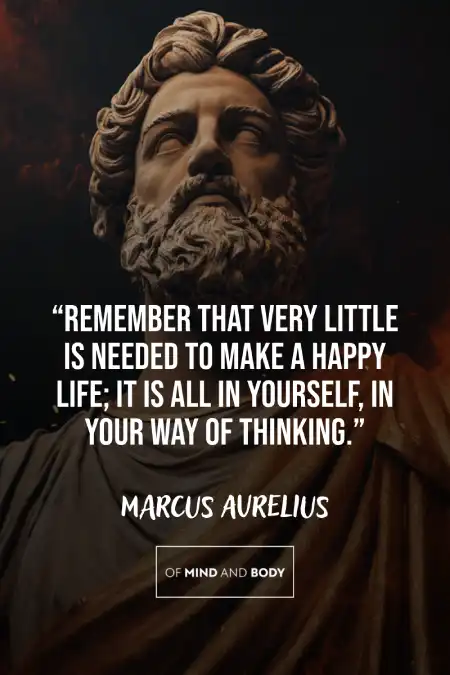
The Wisdom Behind the Words:
Marcus Aurelius highlights the simplicity of true happiness, pointing out that it doesn’t require external wealth or possessions but rather a content and peaceful mind. This quote reflects the Stoic philosophy that happiness is not found in external things but within our own thoughts and perceptions. By cultivating a mindset of contentment and gratitude, we can find happiness in the simplest aspects of life, rather than constantly seeking more.
Modern-Day Application:
In a consumer-driven society where happiness is often equated with material success, this Marcus Aurelius quote offers a refreshing perspective. It suggests that by shifting our focus from external achievements to internal contentment, we can lead a more peaceful and joyful life. Practices such as minimalism, mindfulness, and gratitude exercises are modern ways to embody this wisdom. By appreciating the small things and nurturing a positive mental attitude, we realise that happiness is within our reach, independent of external circumstances.
3.
“It is not death that a man should fear, but he should fear never beginning to live.”

The Wisdom Behind the Words:
Marcus Aurelius urges us to focus on the quality of our lives rather than the inevitability of death. The real tragedy, he suggests, is not death itself but living a life unfulfilled or never truly engaging with the present moment. This quote reflects the Stoic emphasis on living virtuously and with purpose, making the most of our time on earth by fully embracing life rather than being paralysed by the fear of its end.
Modern-Day Application:
In a world where fear of death and anxiety about the future are common, this Marcus Aurelius quote encourages us to shift our focus to living fully in the present. It’s a call to action to pursue our passions, build meaningful relationships, and engage with life’s opportunities without letting the fear of death hold us back. By embracing this philosophy, we can overcome procrastination, take more risks, and live a life that is rich and purposeful, rather than one marked by regrets and missed opportunities.
4.
“Death smiles at us all, but all a man can do is smile back.”

The Wisdom Behind the Words:
This quote from Marcus Aurelius reflects the Stoic acceptance of death as a natural part of life. Rather than fearing death, the Stoic response is to acknowledge its inevitability and meet it with courage and equanimity. Smiling back at death symbolises an acceptance of life’s impermanence and a resolve to live virtuously and fully, regardless of what the future holds.
Modern-Day Application:
In contemporary life, where death is often a taboo subject and a source of great fear, this Marcus Aurelius quote offers a liberating perspective. By accepting the reality of death, we can reduce the anxiety that comes from trying to avoid or deny it. This acceptance can lead to a more fearless and intentional way of living, where we focus on what truly matters—such as love, integrity, and personal growth—knowing that our time is finite. It encourages us to live in such a way that when death does come, we can meet it with a smile, knowing we lived fully.
5.
“Look within. Within is the fountain of good, and it will ever bubble up, if thou wilt ever dig.”

The Wisdom Behind the Words:
Marcus Aurelius reminds us that the source of all goodness lies within ourselves. The “fountain of good” symbolises our innate capacity for virtue, wisdom, and moral clarity. This quote reflects the Stoic belief that by turning inward and cultivating our inner resources, we can access a limitless well of goodness and strength. It encourages self-reflection and the continual pursuit of self-improvement.
Modern-Day Application:
In a world where external validation and material success are often pursued at the expense of inner fulfilment, this Marcus Aurelius quote encourages us to prioritise our internal development. Practices such as meditation, journaling, and self-reflection can help us tap into this “fountain of good” within, leading to greater clarity, peace, and moral fortitude. By focusing on our inner world, we can cultivate the virtues that define a good life, such as kindness, integrity, and wisdom, which in turn enrich our external experiences.
6.
“Choose not to be harmed — and you won’t feel harmed. Don’t feel harmed — and you haven’t been.”

The Wisdom Behind the Words:
Marcus Aurelius teaches that harm is often a matter of perception rather than an objective reality. The quote reflects the Stoic idea that we have the power to choose our reactions to events, and by choosing not to see ourselves as harmed, we maintain our emotional and psychological resilience. This wisdom emphasises the importance of maintaining inner strength and not allowing external circumstances to dictate our inner state.
Modern-Day Application:
In modern life, where we are frequently exposed to criticism, conflict, and adversity, this Marcus Aurelius quote is a powerful tool for emotional resilience. By re-framing situations and choosing not to feel harmed, we can protect our well-being and maintain a sense of control over our emotions. This approach aligns with practices such as cognitive re-framing and emotional intelligence, which help us navigate challenges without being overwhelmed by negative emotions. It empowers us to respond to difficulties with calmness and strength, rather than feeling victimised or defeated.
7.
“The impediment to action advances action. What stands in the way becomes the way.”
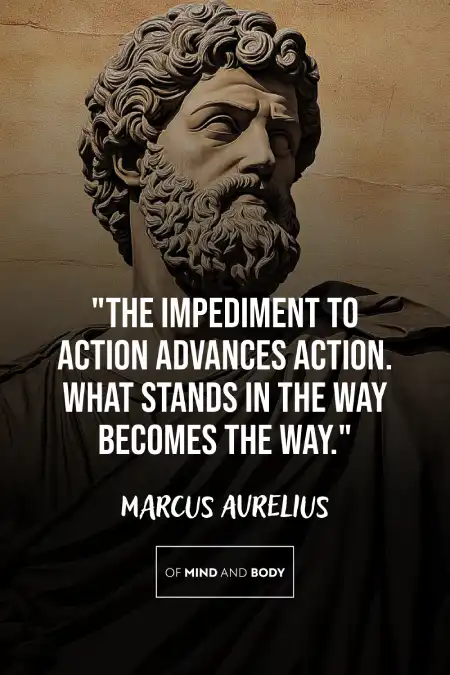
The Wisdom Behind the Words:
In this quote, Marcus Aurelius encapsulates the Stoic philosophy of turning obstacles into opportunities. The wisdom here is in recognising that challenges and barriers are not just hindrances to be overcome but are integral to the process of growth and achievement. Instead of viewing obstacles as reasons to stop, Stoicism teaches that these impediments should be embraced as part of the journey. The very things that block our path can, if approached correctly, become the catalysts for progress. This mindset shifts the perspective from frustration to empowerment, where every challenge is seen as an essential part of the path forward.
Modern-Day Application:
In today’s world, where setbacks and difficulties are inevitable, this Marcus Aurelius quote serves as a powerful reminder to adopt a resilient and proactive approach to challenges. Whether in personal life, work, or creative endeavours, obstacles often appear insurmountable. However, by applying this Stoic principle, we can re-frame these obstacles as opportunities for innovation, learning, and growth. For instance, a career setback can be seen not as a failure but as a chance to reassess one’s goals and pursue a new direction. Similarly, challenges in relationships can lead to deeper understanding and stronger connections. By seeing the impediment as the way forward, we cultivate resilience and the ability to turn adversity into advantage.

8.
“Very little is needed to make a happy life; it is all within yourself, in your way of thinking.”
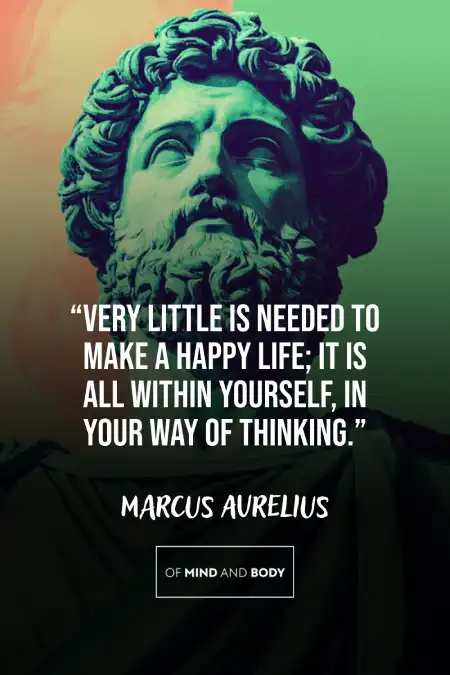
The Wisdom Behind the Words:
This quote reiterates a core Stoic belief that happiness is not dependent on external wealth or circumstances but on our mindset and attitude. Marcus Aurelius emphasises that contentment and joy are accessible through simple, internal shifts in perspective, rather than through the pursuit of external pleasures or possessions.
Modern-Day Application:
In contemporary life, where consumerism and external achievements are often seen as the keys to happiness, this Marcus Aurelius quote offers a counter-cultural perspective. It encourages us to focus on cultivating a positive and grateful mindset, recognising that true happiness comes from within. Mindfulness practices, gratitude journaling, and simplifying one’s life can all help align with this wisdom, allowing us to find joy in the present moment and in the simple pleasures of life.
9.
“The object of life is not to be on the side of the majority, but to escape finding oneself in the ranks of the insane.”
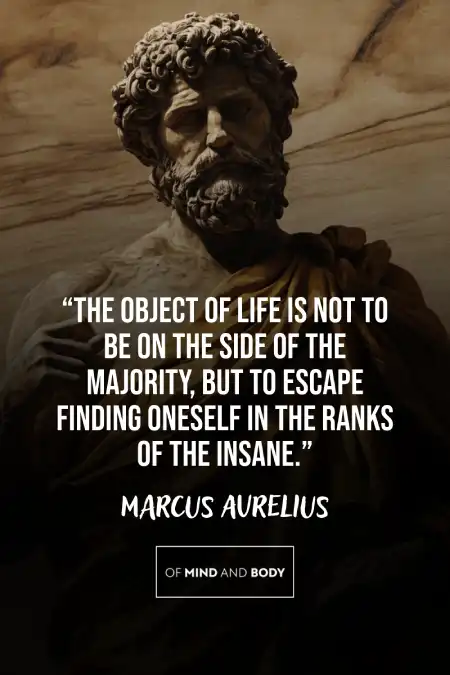
The Wisdom Behind the Words:
Marcus Aurelius challenges the notion that popular opinion or majority behaviour is inherently correct. The wisdom in this quote lies in the Stoic principle of independent thought and virtue. Rather than conforming to the majority, the true goal is to maintain one’s integrity and rationality, even when it means standing apart from the crowd. The “insane” here symbolises the irrational or unvirtuous behaviours often adopted by the masses.
Modern-Day Application:
In an era of social media and widespread conformity, this Marcus Aurelius quote is a powerful reminder to think critically and uphold one’s values, even when they go against popular opinion. It encourages individuals to live authentically and not be swayed by trends or societal pressures that compromise their integrity. This might involve making unpopular decisions in both personal and professional contexts, but it ultimately leads to a life of greater coherence and self-respect.
10.
“Everything we hear is an opinion, not a fact. Everything we see is a perspective, not the truth.”
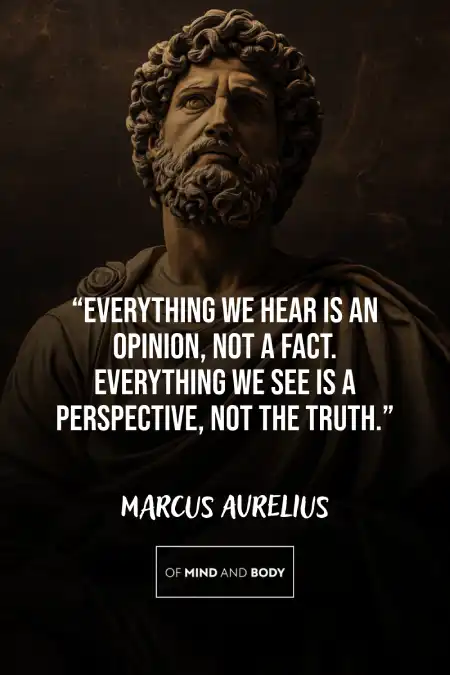
The Wisdom Behind the Words:
Marcus Aurelius highlights the subjective nature of human perception in this quote, reminding us that our understanding of the world is filtered through our own biases, interpretations, and limited perspectives. The wisdom here is in recognising that what we often take as objective truth is merely a collection of opinions and viewpoints shaped by individual experiences and contexts. This Stoic insight encourages humility in our beliefs and opinions, as well as an openness to other perspectives.
Modern-Day Application:
In today’s information-rich world, where opinions are frequently presented as facts and perspectives often clash, this Marcus Aurelius quote is particularly relevant. It serves as a reminder to approach information critically and with an awareness of its subjective nature. This understanding can help us navigate debates, social media, and news with a more discerning eye, allowing us to separate fact from opinion and remain open to multiple viewpoints. By recognising the limitations of our own perspective, we can engage in more constructive and empathetic conversations, fostering greater understanding and reducing conflict in our interactions with others.
11.
“You have power over your mind – not outside events. Realize this, and you will find strength.”

The Wisdom Behind the Words:
Marcus Aurelius emphasises the Stoic principle that true power lies in controlling our own mind and reactions, rather than trying to control external events. The wisdom in this quote is the recognition that while we cannot always influence what happens around us, we have full authority over our thoughts, attitudes, and responses. This internal locus of control is a source of immense strength, as it empowers us to maintain peace and stability regardless of external circumstances.
Modern-Day Application:
In today’s unpredictable world, this Marcus Aurelius quote is a vital reminder of where our true power lies. By focusing on what we can control—our thoughts and reactions—we can navigate challenges with greater resilience and calm. Whether dealing with personal setbacks, global crises, or everyday stresses, understanding that our response is within our control allows us to remain composed and effective. Practices like mindfulness, meditation, and cognitive behavioural techniques help reinforce this perspective, enabling us to maintain our inner strength in the face of external challenges.
12.
“You always own the option of having no opinion. There is never any need to get worked up or to trouble your soul about things you can’t control.”

The Wisdom Behind the Words:
Marcus Aurelius introduces the concept of detachment from unnecessary concerns by advising that we don’t always need to have an opinion on everything. The wisdom here lies in the understanding that many issues are beyond our control, and getting emotionally involved in them only disturbs our peace. This quote encourages selective engagement, where we conserve our mental and emotional energy for what truly matters and is within our control.
Modern-Day Application:
In a world where opinions are constantly being shared and debated, especially on social media, this Marcus Aurelius quote is particularly relevant. It reminds us that it’s okay to refrain from forming or expressing opinions on matters that do not concern us or that we cannot influence. By doing so, we protect our mental well-being and avoid unnecessary stress. This approach also fosters a more peaceful and focused mind, allowing us to concentrate on what truly matters in our personal and professional lives.
13.
“If it is endurable, then endure it. Stop complaining.”
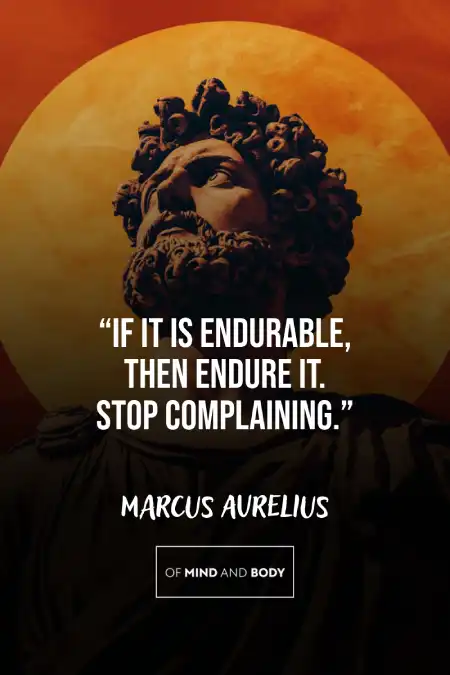
The Wisdom Behind the Words:
Marcus Aurelius offers a straightforward Stoic approach to hardship in this quote: if something can be endured, then it should be, without complaint. The wisdom here lies in the Stoic acceptance of life’s difficulties as a natural part of existence. Complaining does nothing to alleviate suffering; instead, it drains energy that could be better used in enduring and overcoming challenges. This quote encourages resilience and the strength to bear what life throws our way.
Modern-Day Application:
In modern life, where complaining can often be a default response to inconvenience or discomfort, this Marcus Aurelius quote serves as a reminder to practise endurance and resilience. Instead of focusing on the negatives and vocalising them, we can choose to accept challenges as they come and focus on constructive responses. This mindset not only strengthens our character but also helps us navigate difficulties more effectively, fostering a more positive and proactive approach to life’s inevitable challenges.
14.
“The best revenge is to be unlike him who performed the injustice.”

The Wisdom Behind the Words:
Marcus Aurelius advises that the best way to deal with injustice is not through retaliation but by living according to one’s own principles. The wisdom in this quote is the Stoic belief that maintaining one’s virtue and integrity is the highest form of response to wrongdoing. By refusing to stoop to the level of those who commit injustices, we not only preserve our moral character but also demonstrate the strength of our principles.
Modern-Day Application:
In today’s world, where conflicts and grievances can easily lead to cycles of retaliation, this Marcus Aurelius quote offers a path of peace and moral fortitude. By choosing not to mirror the behaviour of those who wrong us, we rise above pettiness and maintain our dignity. This approach is applicable in personal relationships, professional environments, and even social interactions. Instead of seeking revenge or harbouring resentment, we can focus on being the best version of ourselves, which is the ultimate form of success and self-respect.
15.
“Never let the future disturb you. You will meet it, if you have to, with the same weapons of reason which today arm you against the present.”

The Wisdom Behind the Words:
Marcus Aurelius encourages us to trust in our ability to face future challenges with the same rationality and strength we use to handle present ones. The wisdom here is in recognising that worrying about the future is futile; instead, we should have confidence in our capacity to address whatever comes our way with the tools and reasoning we already possess. This quote reinforces the Stoic idea of focusing on the present moment and trusting in one’s ability to navigate life’s uncertainties.
Modern-Day Application:
In a time when anxiety about the future is a common concern, this Marcus Aurelius quote provides reassurance and guidance. It encourages us to stay grounded in the present and not allow fears of the unknown to disturb our peace. By cultivating a mindset of trust in our own reasoning and resilience, we can approach the future with calm and confidence. Practices such as mindfulness, planning, and self-reflection help reinforce this approach, allowing us to meet future challenges as they come, rather than being paralysed by worry.
16.
“Waste no more time arguing about what a good man should be. Be one.”

The Wisdom Behind the Words:
Marcus Aurelius calls for action over debate in this quote, emphasising that instead of discussing what constitutes a good person, we should focus on embodying those qualities ourselves. The wisdom here is in the recognition that virtue is best demonstrated through action rather than theoretical discussion. This reflects the Stoic emphasis on living according to one’s principles and values rather than merely talking about them.
Modern-Day Application:
In a world where moral and ethical discussions are abundant, this Marcus Aurelius quote reminds us that actions speak louder than words. It’s a call to live authentically and in alignment with our values, rather than just engaging in abstract debates about morality. By focusing on our own behaviour and striving to be the best version of ourselves, we contribute more meaningfully to society and inspire others through example. This approach can be applied in all areas of life, from personal relationships to professional conduct, where integrity and virtue are demonstrated through consistent, principled actions.
17.
“Accept the things to which fate binds you, and love the people with whom fate brings you together, but do so with all your heart.”

The Wisdom Behind the Words:
Marcus Aurelius speaks to the Stoic acceptance of fate and the importance of fully embracing the people and circumstances that life presents. The wisdom here lies in the idea that peace and fulfilment come from accepting what we cannot change and choosing to love and appreciate the present moment and the people in it. This quote encourages us to find contentment and meaning in our relationships and circumstances, rather than resisting or wishing for something different.
Modern-Day Application:
In modern life, where many people struggle with dissatisfaction or the desire for different circumstances, this Marcus Aurelius quote offers a path to contentment. By accepting and embracing what fate has brought into our lives—whether it’s people, situations, or challenges—we can cultivate a deeper sense of peace and gratitude. This approach can transform our relationships and our outlook on life, leading to a more loving and wholehearted engagement with the world around us. It encourages us to live fully in the present, appreciating what we have rather than longing for what could be.
18.
“If you are distressed by anything external, the pain is not due to the thing itself, but to your estimate of it; and this you have the power to revoke at any moment.”

The Wisdom Behind the Words:
Marcus Aurelius highlights the Stoic belief that our emotional reactions are not caused by external events but by our interpretations of them. The wisdom in this quote is the understanding that we have the power to change our perception and, consequently, our emotional response. By recognising that our distress is a result of our own judgements, we can choose to re-frame our thoughts and regain control over our emotions.
Modern-Day Application:
In a world where stress and anxiety are prevalent, this Marcus Aurelius quote offers a powerful tool for emotional management. It reminds us that we can change how we feel by changing how we think. By practising cognitive re-framing, mindfulness, and self-awareness, we can alter our perception of challenging situations and reduce their emotional impact. This approach is especially useful in high-stress environments, where maintaining emotional control is crucial. By recognising that we have the power to revoke our distress, we empower ourselves to face life’s challenges with greater calm and resilience.
19.
“Don’t be overheard complaining… Not even to yourself.”
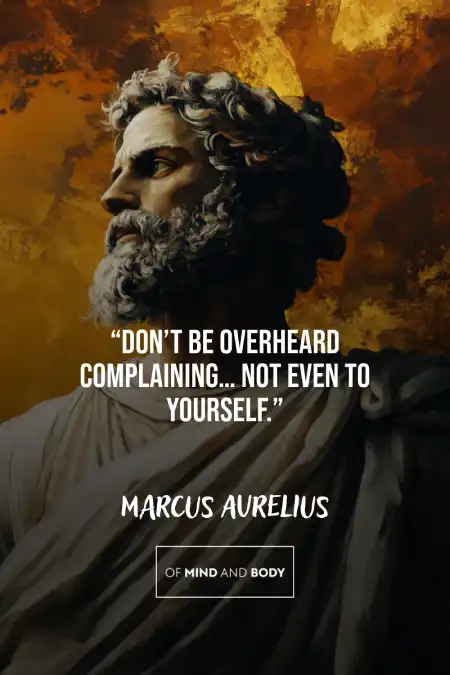
The Wisdom Behind the Words:
Marcus Aurelius advises against the habit of complaining, even internally, as it undermines our mental strength and resilience. The wisdom in this quote lies in the understanding that complaining, whether aloud or in our thoughts, is counterproductive and weakens our ability to face challenges. Instead, Stoic philosophy encourages us to accept circumstances as they are and focus on constructive action rather than negativity.
Modern-Day Application:
In today’s society, where complaining is often seen as a way to vent or bond with others, this Marcus Aurelius quote challenges us to adopt a more Stoic approach. By refraining from complaining, even in our private thoughts, we cultivate a stronger, more positive mindset. This doesn’t mean ignoring problems but rather addressing them with a solution-oriented attitude. This practice can lead to greater emotional resilience, improved relationships, and a more productive and peaceful life. It encourages us to focus on what we can change and accept what we cannot, without wasting energy on complaints.
20.
“If it is not right, do not do it; if it is not true, do not say it.”

The Wisdom Behind the Words:
Marcus Aurelius encapsulates the Stoic commitment to virtue and truth in this concise yet profound quote. The wisdom here is in the clarity and simplicity of ethical living: only engage in actions that are morally right and speak only what is true. This quote reflects the Stoic emphasis on integrity, where every action and word is guided by a commitment to what is just and honest.
Modern-Day Application:
In the modern world, where ethical dilemmas and misinformation are common, this Marcus Aurelius quote serves as a powerful guide for maintaining integrity. It reminds us to consider the moral implications of our actions and the truthfulness of our words before we act or speak. By adhering to this principle, we build trust, respect, and credibility in both our personal and professional lives. This quote encourages us to be mindful of our behaviour and communication, ensuring that they align with our values and contribute positively to the world around us.
21.
“Look back over the past, with its changing empires that rose and fell, and you can foresee the future, too.”
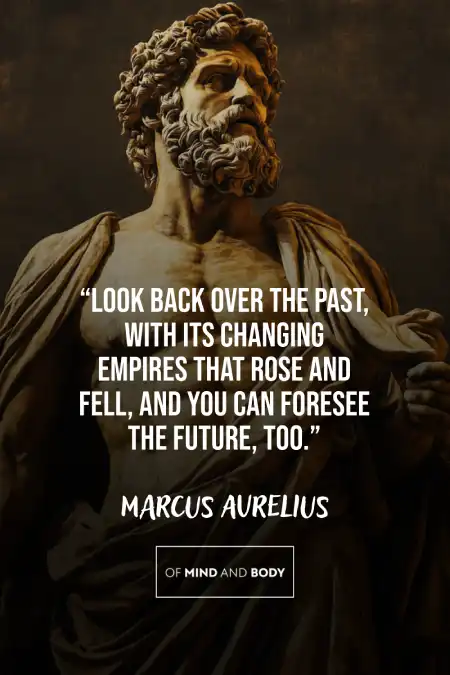
The Wisdom Behind the Words:
Marcus Aurelius invites us to reflect on history as a way to gain perspective on the present and future. The wisdom in this quote is the recognition that patterns repeat themselves over time. By studying the rise and fall of empires, we can understand the transient nature of power and events, allowing us to predict future trends and prepare for inevitable changes. This reflection on history fosters a sense of humility and awareness of the broader forces at play in the world.
Modern-Day Application:
In today’s fast-paced world, this Marcus Aurelius quote encourages us to take a step back and learn from history. Understanding the cyclical nature of events can help us navigate modern challenges with greater insight and foresight. For instance, in business or politics, recognising patterns from the past can guide better decision-making in the present. It also reminds us that current difficulties are not unprecedented and can be overcome. By applying the lessons of history, we can approach the future with a more informed and balanced perspective, reducing anxiety and enhancing our ability to adapt to change.
22.
“When you arise in the morning, think of what a precious privilege it is to be alive.”

The Wisdom Behind the Words:
Marcus Aurelius emphasises the importance of gratitude and mindfulness in this quote. The wisdom here lies in the daily practice of recognising life itself as a precious gift. By beginning each day with this awareness, we can cultivate a deeper appreciation for our existence and approach the day’s challenges with a sense of purpose and joy. This perspective aligns with Stoic teachings on living in accordance with nature and embracing the present moment.
Modern-Day Application:
In a world where it’s easy to take life for granted, this Marcus Aurelius quote serves as a powerful reminder to practice gratitude each morning. By consciously acknowledging the privilege of being alive, we set a positive tone for the day and strengthen our resilience against stress and negativity. This practice can be incorporated into a morning routine through meditation, journaling, or simply taking a moment to reflect on the miracle of existence. It encourages us to live each day fully, appreciating the opportunities and experiences that life offers.
23.
“Loss is nothing else but change, and change is Nature’s delight.”
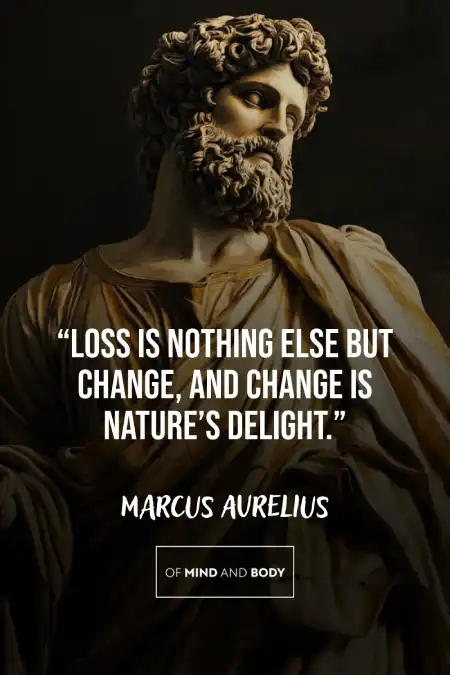
The Wisdom Behind the Words:
Marcus Aurelius re-frames loss as a natural part of life’s constant flux, emphasising that change is inherent to the nature of the world. The wisdom in this quote is the understanding that loss, whether of people, things, or situations, is simply a manifestation of change, which is essential to the cycle of life. By accepting this, we can find peace in the face of loss and embrace change as a vital, even joyful, aspect of existence.
Modern-Day Application:
In contemporary life, where change often brings anxiety and resistance, this Marcus Aurelius quote offers a perspective that can help us navigate transitions more gracefully. Whether dealing with personal loss, career shifts, or societal changes, understanding that change is natural and even necessary can alleviate the fear and grief associated with it. This mindset allows us to flow with life’s changes rather than resist them, fostering resilience and adaptability. By embracing change as Nature’s delight, we open ourselves to new possibilities and growth opportunities.
24.
“Leave the past behind, let the grand design take care of the future, and instead only rightly guide the present to reverence and justice.”

The Wisdom Behind the Words:
Marcus Aurelius advocates for focusing on the present moment while trusting in the natural order of things for the future. The wisdom here is the Stoic principle of living in the present with integrity and virtue, without being burdened by past regrets or future anxieties. This quote encourages us to act with reverence and justice in the here and now, knowing that the future will unfold as it should.
Modern-Day Application:
In today’s world, where it’s easy to get caught up in regrets about the past or worries about the future, this Marcus Aurelius quote offers a grounding approach to life. By focusing on what we can control—the present moment—we can live more mindfully and purposefully. This mindset helps reduce stress and anxiety, allowing us to make decisions based on our values and ethics rather than fear or regret. Practices such as mindfulness, meditation, and conscious decision-making align with this wisdom, helping us to live a life of reverence and justice in the present.
25.
“The soul becomes dyed with the colour of its thoughts.”

The Wisdom Behind the Words:
Marcus Aurelius emphasises the profound impact of our thoughts on our inner being. The wisdom in this quote lies in the recognition that our thoughts shape our character, emotions, and overall outlook on life. Just as a fabric absorbs dye, our soul absorbs the quality of our thoughts, whether positive or negative. This insight underscores the importance of cultivating virtuous and constructive thoughts to nurture a healthy, vibrant soul.
Modern-Day Application:
In modern life, where we are constantly bombarded with information and stimuli, this Marcus Aurelius quote reminds us to be mindful of our mental diet. The thoughts we entertain daily directly influence our mood, behaviour, and overall well-being. By consciously choosing to focus on positive, empowering, and virtuous thoughts, we can cultivate a more resilient and joyful inner life. Practices such as positive affirmations, gratitude journaling, and mental discipline are ways to ensure that the “colour” of our soul remains bright and uplifting.

26.
“Think of the life you have lived until now as over and, as a dead man, see what’s left as a bonus and live it according to Nature. Love the hand that fate deals you and play it as your own, for what could be more fitting?”

The Wisdom Behind the Words:
Marcus Aurelius offers a profound perspective on life and fate, suggesting that we treat each new day as a gift, a “bonus” that we should live fully in accordance with Nature. The wisdom in this quote lies in the Stoic acceptance of fate and the appreciation of life as a temporary and precious opportunity. By viewing the past as a closed chapter and the present as a fresh start, we can live more intentionally and in harmony with the natural order of things.
Modern-Day Application:
In today’s fast-paced world, where people often dwell on past mistakes or worry about the future, this Marcus Aurelius quote encourages us to embrace the present moment as a gift. By treating each day as a new beginning, we can let go of past regrets and approach life with a renewed sense of purpose and gratitude. This perspective fosters resilience and a positive outlook, helping us to face challenges with acceptance and to live in alignment with our values and nature. It encourages us to make the most of the time we have, seeing each day as an opportunity to live well and fully.
27.
“Do not indulge in dreams of having what you have not, but reckon up the chief of the blessings you do possess, and then thankfully remember how you would crave for them if they were not yours.”

The Wisdom Behind the Words:
Marcus Aurelius advises against longing for what we do not have and instead encourages us to focus on and appreciate the blessings already present in our lives. The wisdom in this quote lies in the practice of gratitude, which is central to Stoic philosophy. By shifting our focus from what is lacking to what we already possess, we cultivate a sense of contentment and reduce the desire-driven dissatisfaction that often plagues our minds.
Modern-Day Application:
In a consumer-driven society where people are constantly bombarded with messages of wanting more, this Marcus Aurelius quote is a powerful reminder to practice gratitude. By regularly acknowledging and appreciating the blessings we have—be it health, relationships, or opportunities—we can enhance our sense of well-being and satisfaction. This practice not only reduces envy and dissatisfaction but also fosters a deeper connection with the present moment. Incorporating gratitude exercises into daily routines, such as journaling or mindfulness meditation, can help reinforce this Stoic wisdom and lead to a more fulfilling life.
28.
“The first rule is to keep an untroubled spirit. The second is to look things in the face and know them for what they are.”
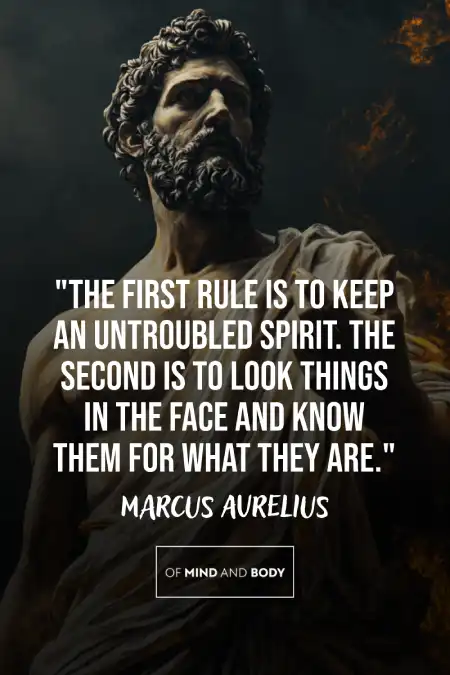
The Wisdom Behind the Words:
Marcus Aurelius emphasises two key principles for a virtuous life: maintaining inner peace and confronting reality with clarity and honesty. The wisdom in this quote lies in the balance between emotional stability and rational perception. By keeping an untroubled spirit, we protect our inner peace, while the practice of seeing things as they are ensures that we remain grounded in truth and reality.
Modern-Day Application:
In a world filled with uncertainty and complexity, this Marcus Aurelius quote offers practical advice for navigating life’s challenges. Keeping an untroubled spirit means cultivating emotional resilience and not allowing external events to disturb our inner calm. This can be achieved through mindfulness, meditation, and stress management techniques. Meanwhile, looking at things “in the face” and seeing them as they are encourages a clear, rational approach to problem-solving and decision-making. By combining these two principles, we can lead a life that is both peaceful and effective, staying true to our values while facing reality head-on.
29.
“We live only now. Everything else is either passed or is unknown.”
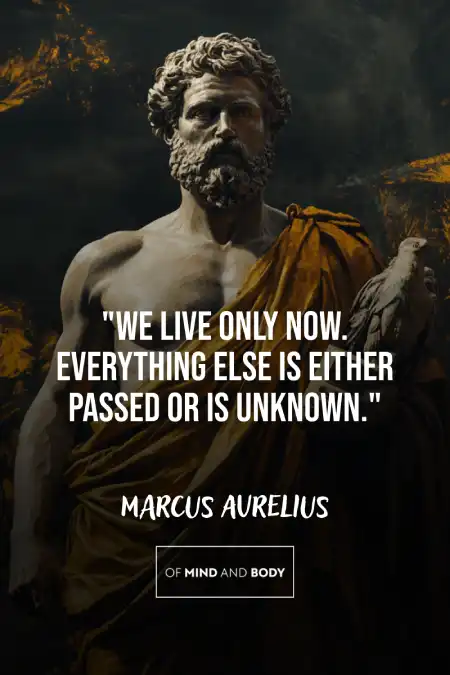
The Wisdom Behind the Words:
Marcus Aurelius reminds us of the fleeting nature of time and the importance of living in the present moment. The wisdom in this quote is the recognition that the past is gone and the future is uncertain, leaving us only with the present to act upon. This emphasis on the “now” aligns with Stoic teachings on mindfulness and the importance of making the most of the present, which is the only time we truly have control over.
Modern-Day Application:
In the modern era, where distractions and future anxieties often pull us away from the present, this Marcus Aurelius quote is a call to mindfulness. It encourages us to focus on the here and now, making conscious choices and fully engaging with the current moment. By doing so, we can reduce stress, improve our relationships, and live a more fulfilling life. Techniques like mindfulness meditation, deep breathing, and conscious living can help us stay anchored in the present, appreciating life as it unfolds moment by moment.
30.
“What we do now echoes in eternity.”

The Wisdom Behind the Words:
Marcus Aurelius speaks to the lasting impact of our actions, suggesting that the choices we make in the present have consequences that resonate far beyond our immediate lives. The wisdom here is in understanding the significance of our decisions and actions, not just for ourselves but for the broader world and future generations. This quote reflects the Stoic belief in living with purpose and integrity, knowing that our deeds contribute to a larger legacy.
Modern-Day Application:
In today’s world, where the effects of our actions—socially, environmentally, and personally—are more interconnected than ever, this Marcus Aurelius quote serves as a powerful reminder to live with intention. Whether in our personal relationships, work, or contributions to society, the decisions we make now have the potential to create ripples that extend far into the future. By acting with integrity, responsibility, and foresight, we can ensure that our legacy is one of positive impact. This perspective encourages us to consider the long-term effects of our actions, inspiring us to live in a way that contributes to a better world for ourselves and others.




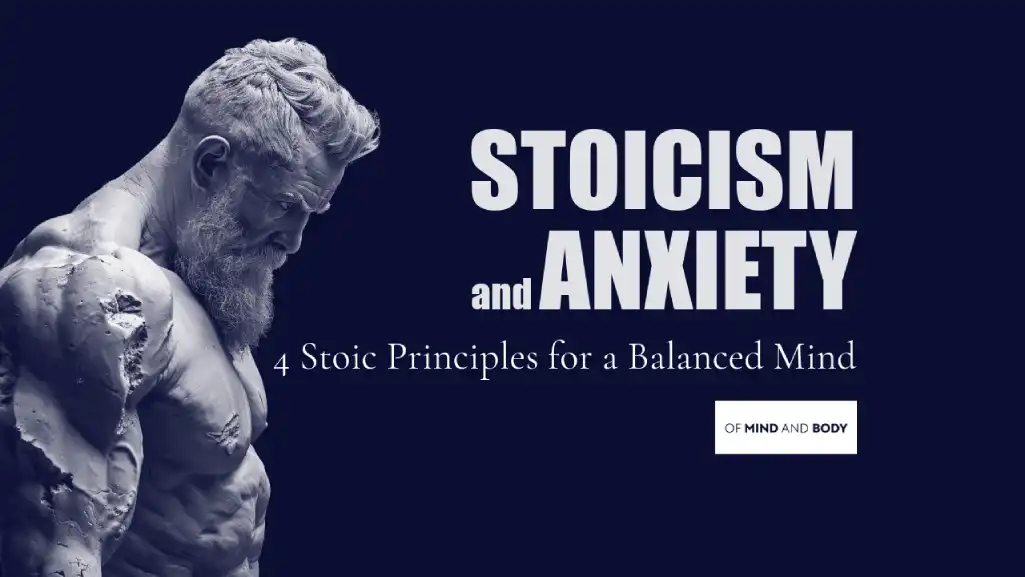
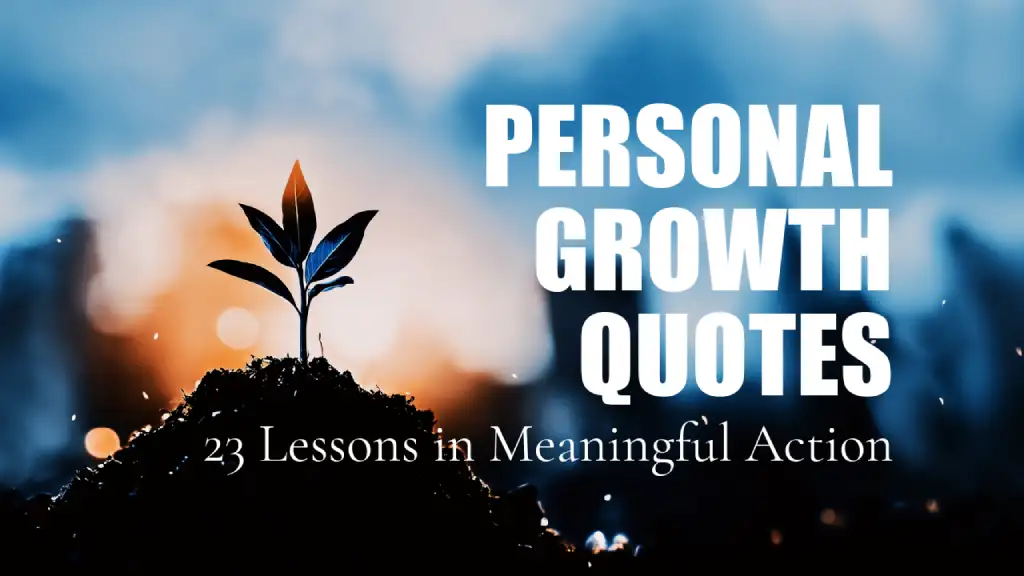

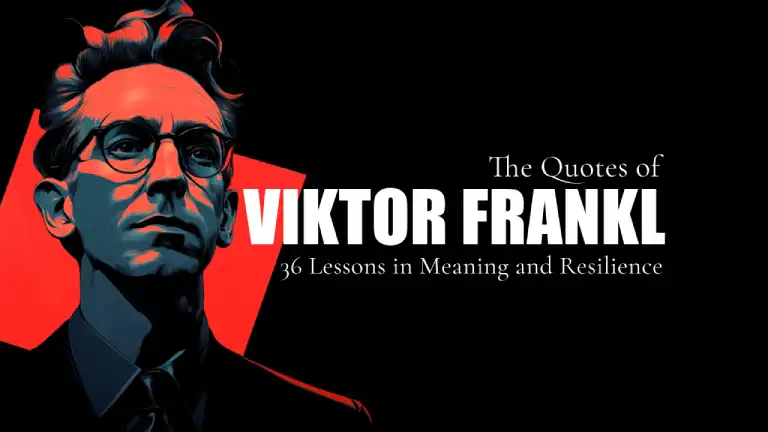
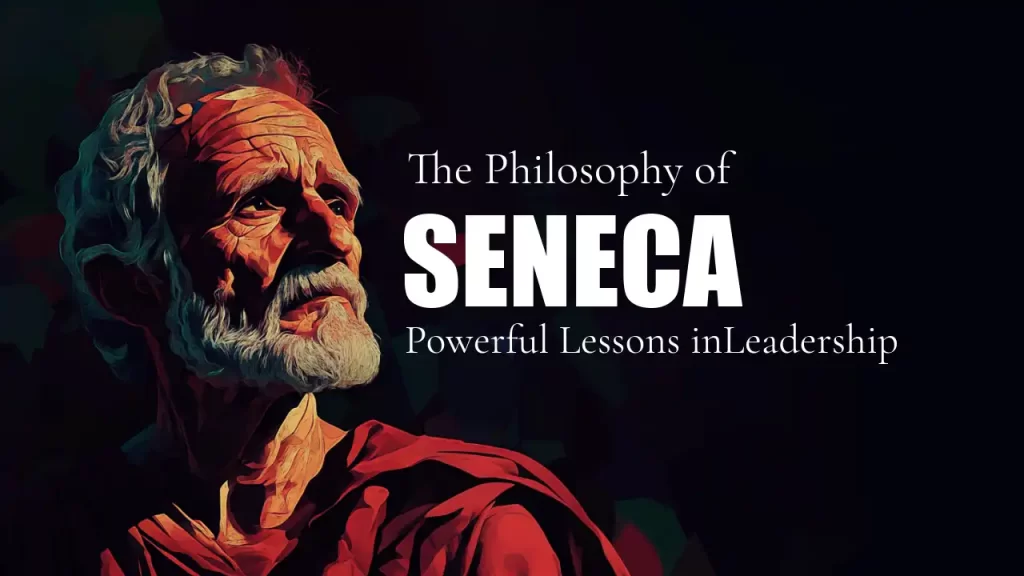
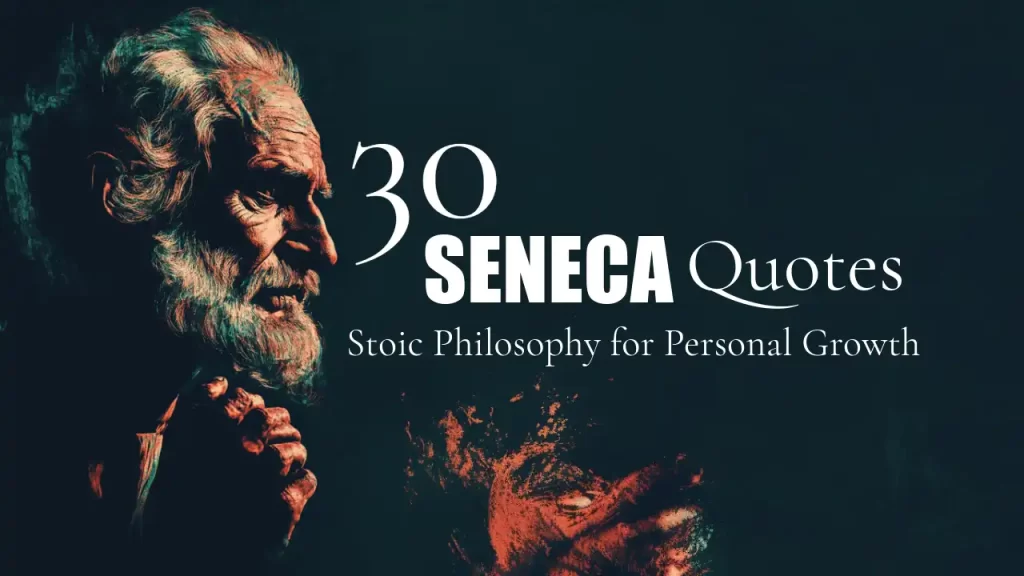


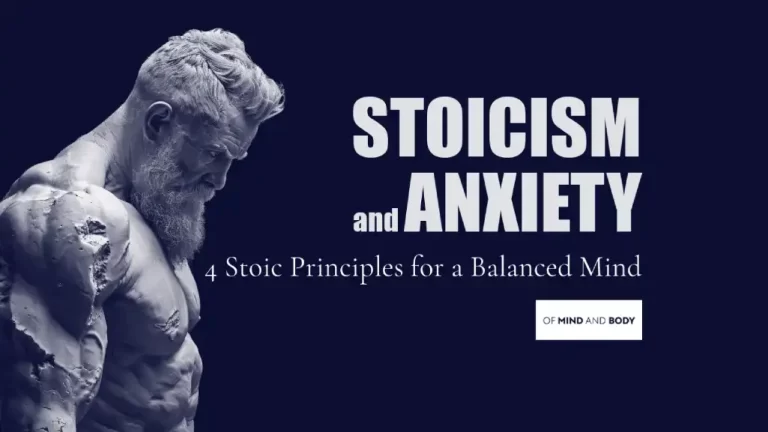
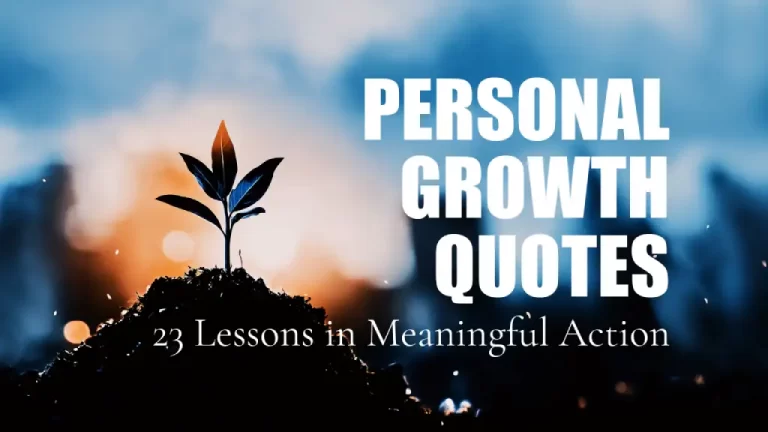

One Response
I LOVE EVERY WORD…and NOW my ONLY regret is not coming upon this TRUTH and WISDOM earlier in my life!!!